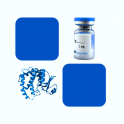
- Remove this product from my favorite's list.
- Add this product to my list of favorites.
Products
Newsletter
 |  |  |  |  |  |

Background
IL-4 is a pleiotropic cytokine produced by activated Th2 cells and mast cells, and plays a pivotal role in immune responses. The effects of IL-4 are mediated after binding to high affinity receptor complexes present on hematopoietic as well as non-hematopoietic cells. Hematopoietic cellular responses to IL-4 are mediated by a high affinity receptor complex comprised of the 140 kDa IL4Rα (CD124)subunit and the 70 kDa common cytokine γc chain (CD132). Interleukin 4 Receptor (IL4R) also known as CD124, IL4Rα and BSF receptor, is a type I cytokine receptor produced by activated Th2 cells and mast cells, and plays an important role in Th2-biased immune responses, alternative macrophage activation, mucosal immunity, allergic inflammation, tumor progression, and atherogenesis. A soluble form of the encoded IL4R protein can be produced by an alternate splice variant or by proteolysis of the membrane-bound protein, and this soluble form can inhibit IL4-mediated cell proliferation and IL5 upregulation by T-cells. IL4R can alternatively associate with IL13Ra1 to form the type II receptor which is responsive to both IL4 and IL13. Interleukin-4 receptor has been shown to interact with SHC1.
Source
Recombinant Biotinylated Human IL-4 R alpha, Avitag,His Tag (ILR-H82E9) is expressed from human 293 cells (HEK293). It contains AA Met 26 - His 232 (Accession # NP_000409.1).
Predicted N-terminus: Met 26
Molecular Characterization
This protein carries an Avi tag (Avitag™) at the C-terminus, followed by a polyhistidine tag.
The protein has a calculated MW of 26.9 kDa. The protein migrates as 35-55 kDa under reducing (R) condition (SDS-PAGE) due to glycosylation.
Biotinylation
Biotinylation of this product is performed using Avitag™ technology. Briefly, the single lysine residue in the Avitag is enzymatically labeled with biotin.
Biotin:Protein Ratio
Passed as determined by the HABA assay / binding ELISA.
Endotoxin
Less than 1.0 EU per μg by the LAL method.
Purity
>95% as determined by SDS-PAGE.
Formulation
Lyophilized from 0.22 μm filtered solution in PBS, pH7.4. Normally trehalose is added as protectant before lyophilization.
Reconstitution
Please see Certificate of Analysis for specific instructions.
For best performance, we strongly recommend you to follow the reconstitution protocol provided in the CoA.
Storage
For long term storage, the product should be stored at lyophilized state at -20°C or lower.
Please avoid repeated freeze-thaw cycles.
This product is stable after storage at:
-20°C to -70°C for 12 months in lyophilized state;
-70°C for 3 months under sterile conditions after reconstitution.
Bioactivity
Please refer to product data sheet.
(1) "Mechanistic insights into immunopathogenesis of murine cerebral malaria: Cues from "young" C57BL/6J and BALB/c mice"
Rai, Girdhar, Siraj et al
Immunol Lett (2023) 256-257, 9-19
(2) "Immune Dysregulation in Acute SARS-CoV-2 Infection"
Grimm, Onyeukwu, Kenny et al
Pathog Immun (2022) 7 (2), 143-170
(3) "NLRP3 agonist enhances radiation-induced immune priming and promotes abscopal responses in anti-PD1 resistant model"
Barsoumian, He, Hsu et al
Res Sq (2023)
Showing 1-3 of 1060 papers.
Follow us